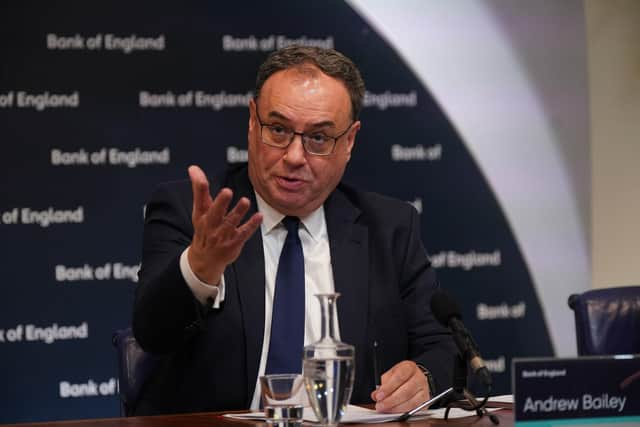Bank of England does not rule out further interest rate rises
The Bank of England’s governor said that inflation has eased slightly as expected, but “remains much too high” and is putting families and businesses under real strain.
In a speech at a cost-of-living conference yesterday, he said that since the Bank’s last meeting in early February, UK economic activity has been a little stronger, but he said wages were also rising firmly, which is adding to inflation pressures.
Advertisement
Hide AdAdvertisement
Hide AdHe said while inflation is forecast to fall sharply over 2023, the Bank was watching the data carefully to ensure that price rises do not become entrenched in the economy.


Mr Bailey said: “Some further increase in Bank Rate may turn out to be appropriate, but nothing is decided.
“The incoming data will add to the overall picture of the economy and the outlook for inflation, and that will inform our policy decisions.”
He added: “At this stage, I would caution against suggesting either that we are done with increasing Bank Rate, or that we will inevitably need to do more.”
Advertisement
Hide AdAdvertisement
Hide AdHe warned that the Bank faces a difficult balancing act following its move to increase rates from 0.1 per cent in December 2021 to 4 per cent.
“If we do too little with interest rates now, we will only have to do more later on. The experience of the 1970s taught us that important lesson.
“But equally – second – we have to monitor carefully how the tightening we have already done is working its way through the economy to the prices faced by consumers.”
“People should not have to worry about inflation in this way,” he added.
Advertisement
Hide AdAdvertisement
Hide AdUK inflation has dropped to 10.1 per cent from a peak of 11.1 per cent last October thanks to sharply lower wholesale energy prices and as last year’s soaring prices drop out of the calculation.
It comes as a committee of MPs has pressed Britain’s biggest banks to explain why some of their savings rates are still significantly lower than the Bank of England base rate.
The Treasury Committee has written to Barclays, HSBC UK, Lloyds Banking Group and NatWest Group.
The letters point out to banks that they have recently reported increases in their net interest margin – the difference between the interest a bank pays to savers and what it receives from borrowers.
Advertisement
Hide AdAdvertisement
Hide AdThe committee wants to know whether net interest margins are linked to the amounts that bank bosses are being paid.
The letters also say that MPs’ constituents may reasonably surmise that banks have taken the opportunity of a rising Bank of England base rate and a reluctance of customers to switch to increase net margins and profits.
The letters point out that some savings accounts are still paying rates of interest below 1 per cent, even though the base rate now stands at 4 per cent.
The MPs question how Barclays, HSBC, Lloyds Banking Group (which includes Halifax and Bank of Scotland) and NatWest Group (including RBS) determine what proportion of interest rate rises to pass on to their savings customers.
Advertisement
Hide AdAdvertisement
Hide AdThe committee also pointed out that several banks have also increased the pay of their chief executives.
For example, the letter addressed to Dame Alison Rose, NatWest Group CEO, says: “We understand that you received total remuneration of £5.2 million in 2022 (up 46% per cent from £3.6 million in 2021)”.